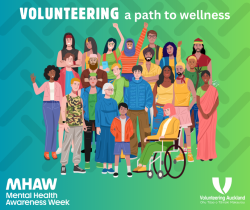Volunteering and Mental Wellbeing: Strengthening Ourselves and Our Communities

As Aotearoa celebrates Mental Health Awareness Week, it’s the perfect time to explore how volunteering plays a powerful role in supporting our mental wellbeing. The Mental Health Foundation’s five daily themes—acts of kindness, supporting local community groups, connecting with loved ones, connecting with your community, and saying thank you—all align beautifully with the spirit of volunteering.
Volunteering is more than just giving your time. It can lift your mood, reduce loneliness, build confidence, and create a deep sense of connection and purpose. Whether you’re helping out once a week, pitching in for a special event, or offering support behind the scenes, volunteering is a two-way gift—benefiting both the volunteer and the community.
Here’s how volunteering supports each of the five wellbeing actions for this week:
1. Acts of Kindness – Mahi Atawhai
Doing something kind for someone else is proven to boost your mood, release feel-good chemicals like dopamine and oxytocin, and give a sense of reward. Volunteering is a consistent way to build these experiences into your life.
You might:
- Help deliver meals to elderly residents through programmes like Meals on Wheels.
- Knit blankets or beanies for premature babies in hospital.
- Write cards or letters to isolated members of the community, especially during colder winter months or over the Christmas/New Year holiday season.
These small, thoughtful actions create ripples of goodwill—supporting your mental health while making someone’s day a bit brighter.
2. Support Local Community Groups – Tautokohia tō hapori
Volunteering with a local community group is a direct way to make a difference. Whether it’s a food bank, school, marae, or conservation group, your contribution matters.
Supporting local groups gives you a sense of belonging and shared purpose—key ingredients for strong mental health.
Examples include:
- Volunteeirng at a community garden, helping grow kai for local whānau.
- Supporting sports clubs with coaching, administration, or event-day assistance.
- Helping with language classes or homework clubs for migrant or refugee families.
You not only help the organisation but grow your own skills, resilience, and networks—especially valuable during times of stress or life transitions.
3. Connect with Important People in Your Life – Whiria te tangata
Volunteering can be a powerful way to strengthen relationships with friends and whānau. Doing good together—side by side—creates shared memories and deepens bonds.
Consider:
- Volunteering as a family for a local beach or park clean-up.
- Getting your work team involved in a volunteer day with a local charity.
- Starting a volunteer project with your mates—like organising a community fundraiser or supporting a school working bee.
Volunteering together brings people closer, helps break down communication barriers, and can be especially beneficial during difficult times when it’s hard to talk but easier to “do something” together.
4. Connect with Your Community – Hononga ki te hapori
A strong sense of connection to your community helps reduce loneliness and promotes mental resilience. Volunteering offers endless ways to meet new people and build relationships with those outside your usual social circle.
Try:
- Becoming a visitor or buddy to someone in aged care or mental health recovery.
- Supporting library programmes that run craft sessions, storytime, or digital help for seniors.
- Joining a community patrol or neighbourhood support group that keeps your area safe and connected.
These roles not only introduce you to new people but often to new perspectives, skills, and opportunities that enrich your life far beyond the task itself.
5. Say Thank You to Someone in Your Community – Whakawhetai ki tētahi i tō hapori
Gratitude is central to mental wellbeing—and volunteering is a beautiful way to express it. Giving your time can be an act of thanks to those who’ve helped you, or to pay it forward to others who need support.
You could:
- Volunteer with an organisation that once helped your whānau—such as Plunket, Hospice, or a migrant support service.
- Help organise a volunteer recognition event for unsung heroes in your neighbourhood.
- Nominate someone for a local award or community recognition—and help behind the scenes to make it happen.
Gratitude in action strengthens relationships, celebrates shared values, and builds collective hope.
Volunteering: A Pathway to Wellbeing
Volunteering is proven to:
- Reduce feelings of isolation
- Increase self-esteem and life satisfaction
- Help people develop coping strategies and emotional resilience
- Promote positive identity and purpose—especially after retirement, job loss, or life changes
Mental Health Awareness Week reminds us that wellbeing is not something we achieve alone—it grows through relationships, purpose, and kindness. Volunteering connects all those dots.
Whether you have one hour a month or time every week, there’s a role for you. Look for opportunities that match your passions, availability, and energy levels. Volunteering is flexible, and many roles can be done online or from home if needed.
Let this week be the start of something new—for you and your community.
Need help finding a volunteer role?
Volunteering Auckland and other regional centres across Aotearoa can help match you with opportunities that align with your interests and availability:
👉 www.volunteeringauckland.org.nz
This Mental Health Awareness Week, consider taking a step toward better wellbeing—for you and those around you—through volunteering.
“Ko koe ki tēnā, ko au ki tēnei kīwai o te kete.”
You take that handle, I’ll take this one—together we carry the load.

